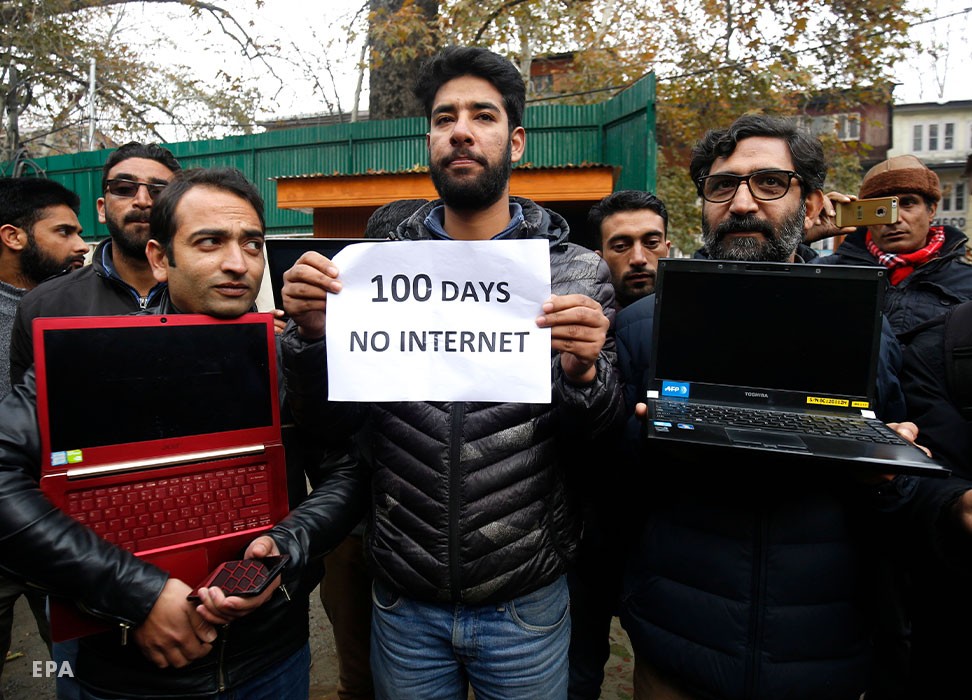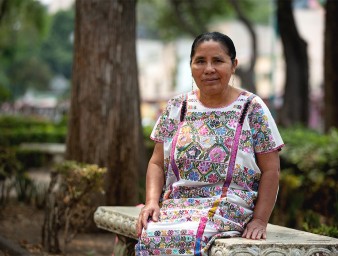Activists: Internet shutdowns violate human rights
19 August 2022

Government-imposed internet shutdowns cause profound damage to the daily lives of millions of people, and undermine a range of human rights, first and foremost the right to freedom of expression,a report of the UN Human Rights Office warns.
Many of these shutdowns are carried out during times of protests and heightened political tensions, including elections. While shutdowns during elections are “a disaster for democracy,” government authorities continue to impose them before, during or immediately after a vote, according to the #KeepItOn coalition, which monitors shutdowns across the world.
In 2021, the coalition group documented seven election-related internet shutdowns in six countries: Chad, the Republic of the Congo, Iran, Niger, Uganda, and Zambia.
“Internet shutdowns do not happen on a normal day,” said Berhan Taye, an independent researcher who advises digital rights groups on advocacy to fight internet shutdowns.
“They happen when countries are having elections, when there is protest in the streets, and when there is excessive use of force by law enforcement, when there are school exams. I think we have to go back to the question of why shutdowns happen. They normally happen to hide egregious human rights violations.”
Taye, who is Ethiopian and has been monitoring human rights violations during the conflict in the Tigray region, said internet shutdowns have a wide impact on many human rights, affecting anything from the right of people to contact relatives and loved ones during emergencies, to access health services, to digital assembly.
“Governments can use (internet shutdowns) as a justification for national security, but what we really know is that when the internet goes off, human rights violations happen,” Taye said.
Myanmar: a “digital dictatorship”
In conflict-affected areas, blocking access to digital tools that are used to document and report abuses can contribute to further violence, said Taye. Disruptions have also been used to cover up atrocities in conflict zones.
In Myanmar, internet access was shut down as tanks, helicopters and soldiers took control of all levers of power during the military coup of February 1, 2021. The junta imposed rolling nationwide internet blackouts and blocked access to social media and messaging platforms in what U.N. experts have decried as an attempt to establish a “digital dictatorship.” Rakhine state, largely populated by marginalized ethnic groups, has experienced years-long shutdowns since 2019.
An expert on digital rights in Myanmar, speaking on condition of anonymity, said the restrictions have had a severe impact on many freedoms and curtailed the human rights of over 50 million people in Myanmar, including the right to safety, security, health, education, food, shelter, livelihood and freedom of expression.
“Internet shutdown has also had a great impact on the work of journalists and researchers who are documenting human rights violations. They rely on communications with local sources, who are currently experiencing the conflict in those areas,” the expert said.
Zambia: Turning threats into victories against attacks
On August 12, 2021, as Zambians were casting their votes in tightly contested general elections, the country’s internet was abruptly switched off. By noon on Election Day, access to WhatsApp, Facebook, Twitter and Instagram had been blocked, causing communication problems across the country and depriving millions of Zambians of the right to freedom of expression and access to information.
The shutdown also affected people’s daily lives, including their ability to carry out financial transfers online. Tensions had been running high ahead of the vote, with many Zambians protesting widespread poverty and the rising cost of living.
In March 2021, the government adopted the Cyber Security and Cyber Crimes Act, which was proposed as early as 2018, to stop what it called a campaign of misinformation and to prevent unrest.
Susan Mwape, a digital rights activist in Zambia, said the shutdown was a clear case of authorities trying to police cyberspace and stifle voices critical of the government.
“The fact that we had a watershed election meant that the interests were high, stakes were high, and in a very polarised environment, the shutdown itself created a lot of speculation, which gave rise to misinformation and disinformation in the process,” said Mwape, who is executive director of Common Cause Zambia, a non-governmental group that works to help prevent internet shutdowns.
“So that shutdown not only prevented citizens from expressing themselves using those platforms, but also deprived them of access to information,” Mwape said.
See you in court
With the challenge of growing government-imposed shutdowns also comes the opportunity to fight the disruptions in a court of law and establish legal precedents, digital rights activists said.
In Zambia, the Chapter One Foundation filed a lawsuit against the Zambia Information and Communications Technology Authority (ZICTA) challenging the internet disruption, and the High Court of Zambia ordered the Government to restore internet access immediately. The matter concluded in a consent judgment between Chapter One Foundation and ZICTA where ZICTA undertook to not disrupt internet access going forward and to inform the public of the reason for any interruption within 36 hours of any event.
The order by the High Court was an important victory against attacks on democracy. Zambia's new President Hakainde Hichilema, who defeated incumbent President Edgar Lungu in the 2021 vote, has expressed his willingness to review the cyber laws, as well as defamation laws that have been used to jail critics, including journalists, Mwape said.
“When we look at the human rights violations of internet shutdowns, they are really enormous. So, we need to get to a place where governments can be held accountable for shutdowns,” she said.
"Internet shutdowns violate fundamental rights of people, including freedom of expression and access to information, they enable governments to cover up atrocities against people". Felicia works with @accessnow to fight #internetshutdowns and #KeepItOn. @UNHumanRights pic.twitter.com/ADP8IXltHT
— European External Action Service - EEAS 🇪🇺 (@eu_eeas) August 15, 2022
"In Venezuela, we see multiple cases of #internetshutdowns. An open, free, secure and safe internet empowers everyone’s human rights and at the same time the economic and social development of countries", says @andresAzp, director of @vesinfiltro. @UNHumanRights @accessnow pic.twitter.com/0gFBsnqx8z
— European External Action Service - EEAS 🇪🇺 (@eu_eeas) August 2, 2022
Especially during elections, #Internetshutdowns affect negatively the possibility of citizens to unite, organise themselves and openly express their opinion, says Aina Shormanbayeva, President of @ILIFoundation in Kazakhstan. @UNHumanRights @accessnow pic.twitter.com/oljzIaYGie
— European External Action Service - EEAS 🇪🇺 (@eu_eeas) August 29, 2022



